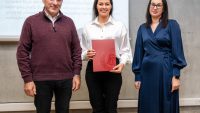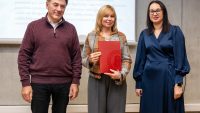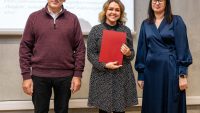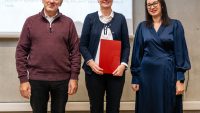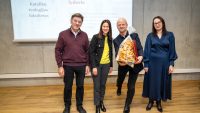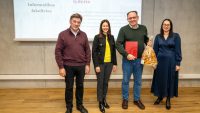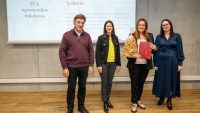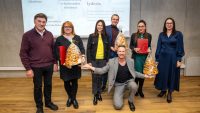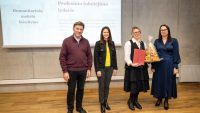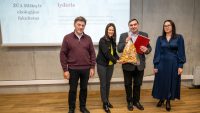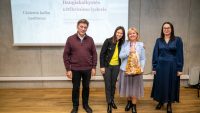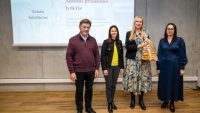VMU Marks World Quality Day with Discussion and Innovation Awards
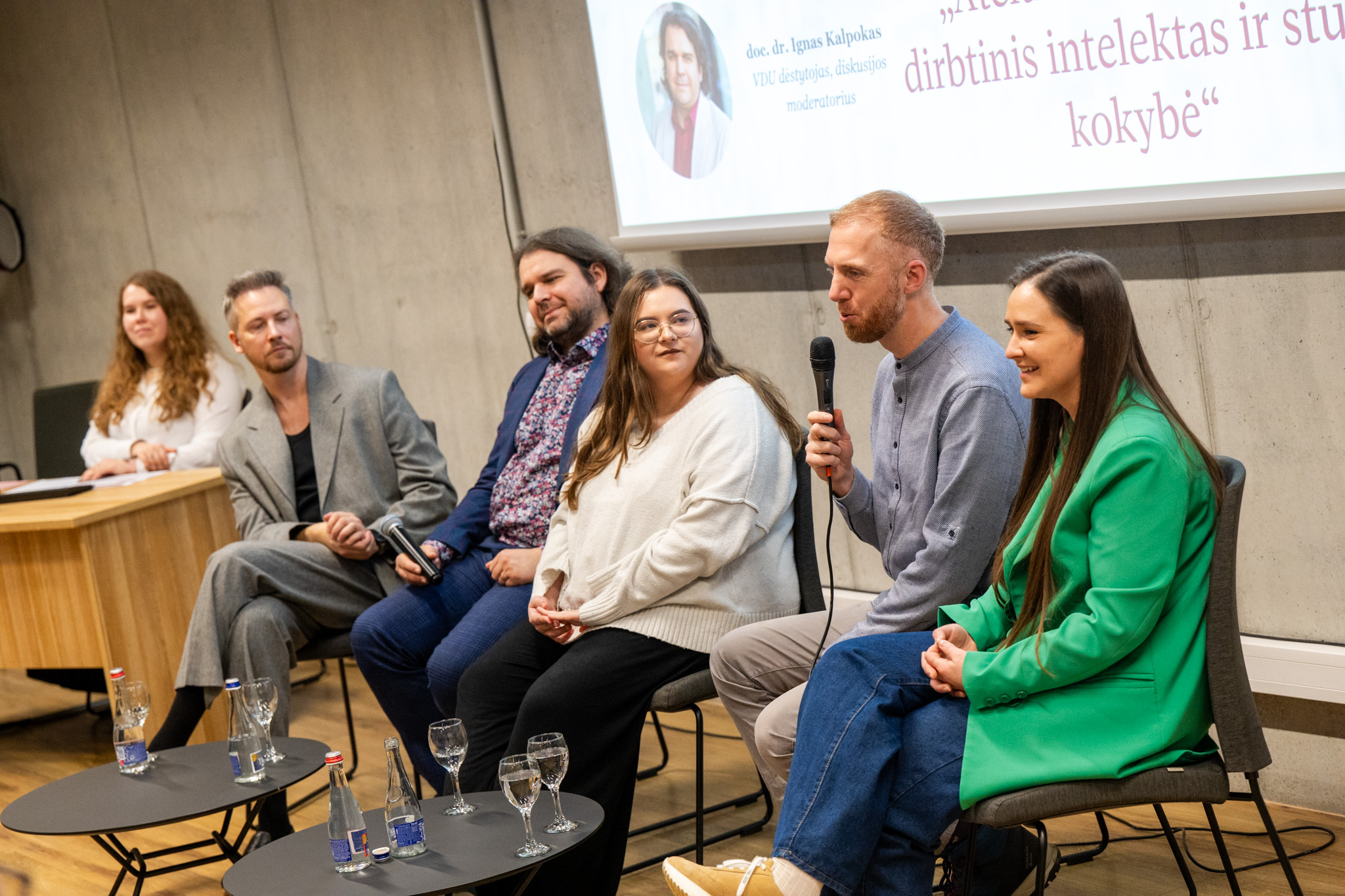
On 14 November, Vytautas Magnus University (VMU) hosted the event Quality 360°, dedicated to World Quality Day, which is celebrated every year on the second Thursday of November at the initiative of the United Nations. The event featured a roundtable discussion on the universities of the future and awards for the most innovative VMU teachers and academic units.
“Sometimes we encounter the belief that quality is only associated with evaluation, accreditation, surveys, or other activities carried out by quality agencies or university units. However, this is a myth. Quality assurance and development are daily activities of all community members, with every employee playing a part in quality development. Therefore, this event is aimed at sharing best practices and fostering community,” said Dr. Simona Pilkienė, VMU Vice-Rector for Studies, introducing the event.

Dr. Simona Pilkienė, VMU Vice-Rector for Studies
The event began with a roundtable discussion titled “The University of the Future: Artificial Intelligence and the Quality of Studies,” where participants discussed how artificial intelligence will change study processes. According to discussion participants, AI tools represent a significant challenge for universities, and their emergence signifies continual changes in the study and quality systems and different learning experiences for students.
“The genie is already out of the bottle; both students and teachers are using artificial intelligence. For me, AI saves time and helps review large data sets and find necessary materials. AI offers opportunities for improvement. On the other hand, we are never guaranteed that our knowledge will not be used to develop AI models. It’s an open secret that our data is sold and used online – we should think about intranets and local AI tools to ensure they are secure,” said VMU teacher Augustinas Balaišis, pointing out the biggest threats and opportunities of AI during the discussion.

VMU teacher Augustinas Balaišis
Other participants also seconded these thoughts. For example, EdTech board member Kotryna Tomkevičiūtė highlighted that AI allows for the analysis of large data sets, empowers both students and lecturers, and that the breakthrough of AI has contributed to personalised education – tailoring content based on individual needs.
“However, there is a risk that people will lose certain skills and abilities and will not develop them because it is easier to have AI perform tasks. Therefore, it is crucial to develop logical, critical thinking and creativity – so that when faced with a problem or wanting to automate a process, we know where to look, for instance, which filter to choose for a photograph,” noted Kotryna Tomkevičiūtė, emphasising that mature personal judgement dictates the ethical use of AI.

EdTech board member Kotryna Tomkevičiūtė
VMU teacher Assoc. Prof. Justinas Kisieliauskas, who also participated in the discussion, remarked that without AI, achieving excellence becomes challenging: artificial intelligence will not replace professionals, but professionals using AI will replace those who do not. This applies to lecturers too – AI cannot replace them, but it changes their role.
“In fields where everything changes by the day and hour, AI becomes an essential tool to check if I am still in context. If I’m not knowledgeable in the field, AI could make me believe that what it says is true because it argues impeccably, even when it’s lying. However, if I am a professional, then I can definitely discern truth from lies. Are we, as teachers, going to rely too much on AI due to the rush and rapidly changing information? I don’t know, but this is a question of personal maturity,” pondered Assoc. Prof. Kisieliauskas.
During the discussion, Gabija Juzėnaitė, a representative of the Lithuanian National Union of Students, pointed to the personalisation of studies as the biggest opportunity for AI – for example, for students who have individual needs arising from disabilities, learning difficulties, or who come from immigrant families and face language barriers. Discussing the risks, she emphasised the use of pupils’ and students’ intellectual property in developing AI models and the unreliability of the information provided by AI.
“AI is somewhat like Wikipedia – we know that it may contain inaccurate information or misinterpret sources. AI makes many mistakes in interpreting research results. But it can provide links to research, allowing for a read-through and assessment of whether AI has interpreted the material correctly and whether the source is reliable,” remarked Gabija Juzėnaitė.

Gabija Juzėnaitė, representative of the Lithuanian National Union of Students
“Try this exercise and ask ChatGPT: ‘Tell me something about myself that I don’t know’ – you’ll likely find at least one aspect that will surprise you. Could you recognise a photoshopped image five years ago? I doubt it. Similarly, with AI, whether it’s video content or photos, it’s especially hard to recognise,” said EdTech board member Kotryna Tomkevičiūtė discussing the progress of artificial intelligence.
Summarising their thoughts, the discussion participants emphasised that the use of artificial intelligence is becoming inevitable, though it presents various challenges. “AI fascinates me because it is very similar to humans. But it also scares me for the same reason,” said Assoc. Prof. Kisieliauskas, who teaches at the VMU Faculty of Economics and Management. The discussion was moderated by Assoc. Prof. Ignas Kalpokas.

Assoc. Prof. Ignas Kalpokas
Awards for the most innovative VMU teachers
In the second part of the event, the most innovative University teachers and academic units were awarded. Teachers were recognised for their innovative initiatives in six categories, with the winner of each category receiving a prize of 1,000 euros. For outstanding innovations in some categories, teachers were rewarded with 500 euros prizes.
“Although this competition is organised for the first time, it has attracted a lot of attention, which is very gratifying – teachers are creating wonderful things, but they remain unnoticed. The awards aim to encourage closer collaboration and the sharing of experiences among teachers,” explained Vice-Rector for Studies Dr. Pilkienė.
In the category of Active Teaching Methods, first place was awarded to the team from the VMU Education Academy – Assoc. Prof. Ilona Tandzegolskienė-Bielaglovė, Assoc. Prof. Nijolė Čiučiulkienė, Prof. Sigitas Daukilas, and Heather Godfrey Gaddis – for their creation and presentation of video reports.

Prof. Sigitas Daukilas
Encouragement prizes in this category were awarded to Jolita Ančlauskaitė, a lecturer at the Institute of Foreign Languages, for a Norwegian language A1 level digital exercise book; Assoc. Prof. Jūratė Tutlytė, a teacher at the Faculty of Arts, for the initiative “Creative Cities: The Researcher’s Journey”; and Assoc. Prof. Aušra Lisinskienė, a lecturer at the Education Academy, for personality profiling in sports.
In the category of Digital Learning Technologies using AI, Foreign Language teacher Vaida Misevičiūtė was selected as the winner for effectively enabling AI in the language learning process.

Vaida Misevičiūtė
In the category of Innovation in Student Achievement Assessment, VMU Education Academy teachers Assoc. Prof. Rasa Nedzinskaitė-Mačiūnienė and Assoc. Prof. Eglė Stasiūnaitienė were selected as the winners for their virtual escape room designed for self-assessment of study achievements.

Assoc. Prof. Rasa Nedzinskaitė-Mačiūnienė and Assoc. Prof. Eglė Stasiūnaitienė
The winner in the Entrepreneurship Promotion category was Assoc. Prof. Vykintas Baublys, a teacher at the Faculty of Natural Sciences, for his project “Biotechnological Product.”

Assoc. Prof. Vykintas Baublys
In the category of Engaging and Individualised Methods, Faculty of Political Science and Diplomacy lecturer Austėja Pečiurienė secured first place for her innovation “Work in a Team – Just Like in the Real World.”

Austėja Pečiurienė
Additionally, seven other innovations in this category were awarded encouragement prizes. The prizes were awarded to an international team of lecturers – Dr. María José de Urraza, Lingyi Chu, Alba Rosa Mennillo, and Kateryna Horlenko (Education Academy) for “The Identity Hive”; to Vitalija Vanagienė (Faculty of Bioeconomy Development, Agricultural
Academy) for “VMU Learning with a Real-Work Flavour”; to Assoc. Prof. Asta Lapėnienė (Education Academy) for the Electronic Teacher’s Diary; to Vigilija Žiūraitė (Institute of Foreign Languages) for an Inclusive ICT and AI-based teaching tool for quality education; to Assoc. Prof. Odeta Norkutė (Education Academy) for “Final Thesis – ‘Without’ a Supervisor”; to Dr. Sigita Šilingaitė (Education Academy) for “Application of the Storytelling Method in General Didactics Lectures”; and to Assoc. Prof. Justinas Kisieliauskas (Faculty of Economics and Management) for “Virtual Dr. Justinas’s Office.”
In the Teacher Collaboration and Co-creation category, Assoc. Prof. Evelina Bendoraitienė and Assoc. Prof. Asta Gaigalienė (Faculty of Economics and Management) secured first place for their hackathon – a problem-based learning method.

Assoc. Prof. Asta Gaigalienė
Encouragement prizes in this category were awarded to Prof. Titas Petrikis (Faculty of Arts) for the interdisciplinary arts bridge, and to Assoc. Prof. Aurelija Stelmokienė and Assoc. Prof. Elena Trepulė (Faculty of Social Sciences and Education Academy) for the development of emotional intelligence through collaboration.

Assoc. Prof. Aurelija Stelmokienė
Awarding VMU academic units for their leadership
“A crucial aspect of quality culture development is the engagement of the entire community and each employee’s contribution. Quality assessment is a multilayered process. While the formal aspects can be measured by specific indicators, no instrument can measure the quality culture – it is something that is expressed individually. Therefore, this year, we asked the units themselves to assess how they identify and contribute to the mosaic of quality culture development. Some nominations were also based on formal criteria. All nominations are fundamental components of quality development,” explained the Vice-Rector for Studies.
The Faculty of Social Sciences was elected as the leader in ensuring academic integrity, the Faculty of Catholic Theology as the leader in community spirit, the Education Academy and Music Academy as leaders in individualised studies, and the Faculty of Informatics as the leader in study innovations.
The Faculty of Agronomy of the Agriculture Academy (AA) was elected as the leader in study quality culture, with the Faculty of Arts and AA Faculty of Engineering recognised as leaders in social partner inclusion, and the Faculty of Economics and Management, AA Faculty of Bioeconomy Development, and the Faculty of Political Sciences and Diplomacy as leaders in internationalisation.
The Faculty of Humanities was chosen as the leader in professional development, the Faculty of Natural Sciences as the leader in synergy between studies and research, the AA Faculty of Forest Sciences and Ecology as the leader in sustainability assurance, the Institute of Foreign Languages as the leader in multilingualism assurance, and the Faculty of Law as the leader in alumni engagement.
The awards ceremony featured a performance by first-year students of the Popular Music programme (Mantas Jankavičius’ class) of the Performing Arts Studies at the VMU Music Academy, Austina Mažeikaitė and Emilija Jankauskaitė, accompanied by Martynas Šaulys.



